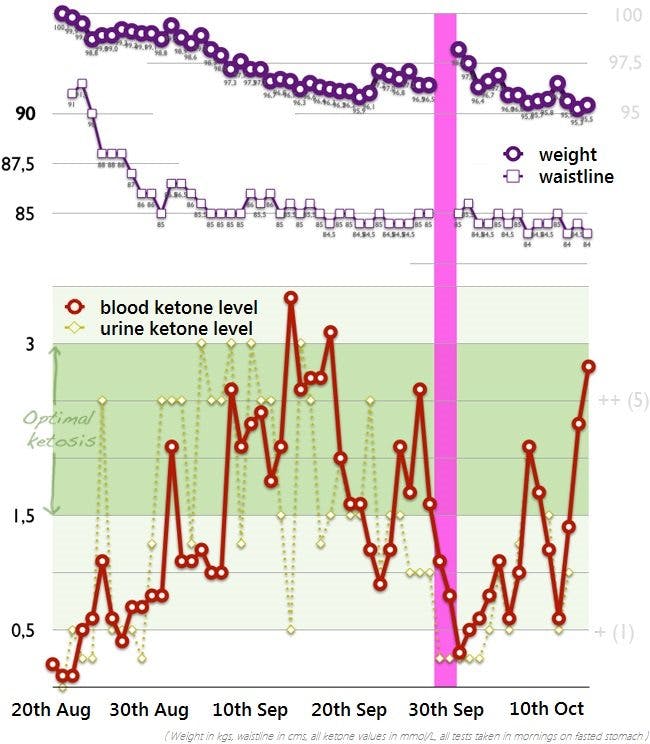Final report: two months of a strict keto diet and ketone monitoring

What happens if you hugely digress from a low-carbohydrate diet and suddenly eat a whole load of carbs?
Here is my final report following two months of a very strict LCHF diet, and daily measurements of four parameters:
- Blood ketones (the red curve)
- Urine ketones (yellow)
- Weight (purple)
- Waistline (purple)
To get familiar with the experiment design, I recommend reading my first report. For results from the first month, have a look at my second report. Here’s the third and final one, discussing the second month.
As you can see from the above graph, I took the opportunity to conduct a side experiment. The pink vertical column marks one weekend where I conciously completely deviated from the low-carbohydrate diet. I was on the Swedish archipelago “Koster” for the year’s lobster premiere, and simply had the same food as everyone else.
So, what happens if you totally veer off the low carb lifestyle after a long period of strict LCHF? Is complete havoc wrought in your body? Do you have to start from scratch again? Here’s the answer:
Lobster weekend
Here are the non-strict LCHF foodstuffs I consumed during the weekend of 28-30th September:
- Three small helpings of pasta
- One “Digestive” biscuit
- A total of 7 slices of bread!
- Some orange juice x 2
- Some chocolate (70% cocoa content)
- Liberal helpings of nuts
- Liberal helpings of sorbet and honeymelon
- Yoghurt with müsli and apple
- An unspecified number of wine glasses (many)
- A pizza!
Result
After finishing off that pizza on my way back home on the Sunday, my ketone meter read “LOW” – that is, a negligible amount of ketones. The ketosis was gone.
I’m sure you’re curious as to how long it takes to return to ketosis after such a monumental digression. Some have claimed it can take up to two weeks, but for me, it didn’t:
- The morning after, I was at 0.3 and one day after that I was at 0.5, which means I was back in ketosis. It took a week for me to get back to my previous “optimal” levels of over 1.5.
- The scales immediately showed +2kgs (+4.5 lbs), but these vanished in a couple of days. In other words, it was all water and glycogen weight. My waistline saw little or no change at all.
- I felt alright the whole time.
Summary: An entire weekend of cheating took me a few days to a week to bounce back from. That’s of course keeping in mind I was very keto-adapted going in. I can however imagine that some people may need more time.
Weight results after two months
As mentioned in my earlier accounts, weight loss was not my ambition when starting this experiment. I was happy with my weight and waistline, which I’ve kept for years with the more liberal LCHF diet I stick to. Interestingly, I still lost a total of 4.5kgs (almost 10 pounds) and a whopping 7cms (over 2.5 inches) around my waist. This happened without the slightest hunger pang.
I had to punch a new hole in my belt. My trousers were falling off – that’s how noticeable it was. I have however kept my original weights at the gym, so I’m assuming there hasn’t been significant muscle loss. This in spite of the fact that I’ve only found time to work out about once weekly.
Lessons learned
The biggest lesson I’ve learned during these two months is how much the effects of a strict LCHF diet can be intensified when taken to optimal ketosis. Also, I’ve seen that it takes more than just great care with carbohydrate to achieve deep ketosis; in fact, you need more fat and less protein than many believe. Too much protein tends to actually inhibit optimal ketosis (a ketone level of over 1.5), instead making it easy to stall at around 0.5.
A handy way to consume more fat and less protein is to drink your coffee with butter and coconut oil (mix with a blender!). One or two mugs of this kind of “fat coffee” gets you feeling so full you won’t be eating too much meat, fish or eggs. Perhaps this brings an environmental as well as monetary saving?
What are your thoughts on these results? Is there anything you’d like to ask? Go ahead and hit me with some comments below, and I’ll do my best to answer.
More
Previous posts on ketone measurement
PS
I’ve conducted two more experiments during this time – reports are soon to come. One of them is the much awaited coffee experiment that’s been requested a lot since I posted the Pepsi Max experiment.